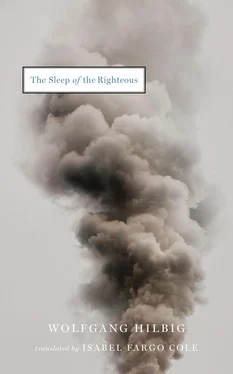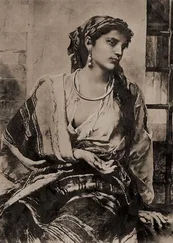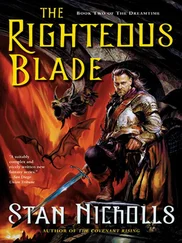But perhaps I could describe quite different times: times in which a solitary rider galloped across the prairie’s endless swells, the broad-brimmed hat on his head as black as the horse beneath his saddle. He thunders up a hill, spying from the ridge a group of men instantly recognizable as bandits. . he reaches for the gun that hangs in a leather holster on his saddle. Without drawing their Colts, the desperados wheel their horses around and flee pell-mell. A slight, barely noticeable smile appears beneath the man’s thin black moustache. He knows that the ruffians have only feigned their flight; once out of sight, they’ll return to lure him into an ambush. The man smiles; he’ll never fall for their tricks. .
Mother, no doubt, would have called such a story impossible, untrue, and utterly unrealistic. But weren’t these made-up stories just as true as ones invented from so-called reality?
There was the story of my grandfather’s gun, for instance: it no longer existed, I had known that for some time; I’d heard it once again from the lips of the gateman, and he was credible, if only because he rarely said a word. But in the older boys’ minds the gun was still there; they wouldn’t stop asking me about it. — The untenable bathing trunks my mother had knitted. . the most untenable of all conceivable bathing trunks forced me to swim in the so-called marsh , the smallest of the mine pits, where the ash heaps encroached upon the water. The water was only a few hundred yards wide, and you could walk from one side to the other; at the deepest spot it barely reached the shoulders. . you could hardly learn to swim in this puddle. Besides, the brown water smelled so unmistakably of coal, a smell, which clung on late into the evening, that Mother realized at once I’d been to the strip mines, where I wasn’t supposed to go. — Why do I give you money for the swimming pool, she said, when you’re just going to the mine pits, and when you can’t even swim, at that. If only you’d at least learn first at the swimming pool, they’ve got life preservers there. .
This caused problems for me, as my friends were also quite reluctant to follow me to the marsh. . when you came out of the marsh water, your bathing trunks were lined with a layer of wet coal residue that collected there like coffee grounds; one day, when I discovered a drowned insect in these grounds, I got rid of the bathing trunks my mother had made and claimed they’d been stolen. — Stolen! Bathing trunks like those? Even Mother could hardly stifle a laugh at this excuse. Why didn’t you just say you didn’t want to wear them? — I had chosen an opportune moment; my aunt from Jena was visiting, my mother’s older sister who worked as an attendant at a Jena swimming pool. — I can’t believe you’d unleash a boy on humanity in such a ridiculous bathing suit, my aunt said. — But the suspenders would’ve been good for pulling him out of the water — he still can’t swim! — If he’s going to learn to swim, he needs proper bathing trunks, said my aunt, an authority in the field.
She went back home, and a few days later a small package arrived from Jena containing three pairs of bathing trunks that fit me perfectly: unclaimed items from the lost and found at my aunt’s swimming pool. — I picked out a navy-blue pair with a miniature white anchor appliqued to the left side. . and with them I could return to the largest of the mine pits, between the marsh and another smaller pit. — One day, caught in the crossfire between two warring bands, I retreated into the water and suddenly fell into a gaping hole, for the bottom fell away in treacherous, unpredictable tiers, depending on how the ground had been excavated: I found myself with my head under water, my feet couldn’t reach bottom; flailing my arms, I struggled to the surface; with my head back above water I saw the lake’s wide, calm expanse before me, one hundred, two hundred yards; the beach lay behind. Instead of yelling for help, I began to paddle my arms — much as dogs do to move through the water — and I paddled, I swam, a sorry sight perhaps, but the water bore me up; I moved slowly, then more quickly, toward the middle of the lake. . once I turned around and saw them watching me from the shore, silent and intent. . now I had no choice, I had to reach the far shore. I felt more and more confident in my dog paddle, and soon I tried, as I’d seen the big kids do, to swing my arms from my hips up over my head, plunge them in again in front of me, and scoop the water down along my body with my palms, attempting my first crawl strokes. . I managed, but it tired me, and soon I fell back into my dog paddle. A few yards from shore I felt a sense of exhilaration; from now on no one, not my mother nor anyone else, could claim I couldn’t swim.
When I reached the other side and crawled onto the bank, exhausted, but with an expression as though nothing special had happened, I saw little Will in front of me, stretched out on a plaid blanket in the grass; next to him, almost leaning on his shoulder, sat a female in a bathing suit, one of her hands on little Will’s stomach; she removed it as soon as she saw me. Little Will was the brother of big Will, and they were the biggest, strongest boys on our street, both equally big and strong, only the little one was a good year younger than the bigger; both were redheads, and regarded as invincible. It was rare to see them apart, and when they weren’t at loggerheads themselves, they put everyone else to flight. Just one by himself was intimidating, and when they made common cause there was no one, even an adult, who could stop them.
So what’s the story with the old man’s gun, little Will asked me, where is it, when are you finally going to bring it? — I’ll bring it, I said, I’ll bring it as soon as I can. — On my way back to the beach, circling the mine pit on foot, I knew I’d stumbled into a trap that could have dire consequences for me.
2
In the gateman’s lodge we were safe. The gateman, or one of them, the silent, one-armed man, always let us in when he had the day shift. Sometimes, when we got caught in a thunderstorm on the way to the mine pits, he practically urged us to come inside.
You needn’t be afraid of the Wills, he said to us, I’ve got them over a barrel. I know they go out at night stealing coal from the coal trains, I could report them any time I like. Can you picture the hell that’ll break loose when the Russian officers find out they’re getting coal stolen from their trains? Off to Siberia, they’ll say, off to Vorkuta, they’ve got coal there too!
As Grandfather sat in front of his summerhouse one afternoon with his gun across his knees, motionless, pipe in his mouth, staring ahead with the corners of his mouth turned down resolutely — he was waiting for a marten that had been threatening the chickens in their shed by the house. . and the chickens were huddled together in a dense mass in the corner, their anxious behavior showing that the marten still lurked somewhere in the tangle of the garden — the police came and took him away. They confiscated the gun. . it was just an ordinary air rifle, a so-called break barrel, but all the same a pre-war model with considerable punch; grandfather cast the pellets for it himself. He was reprimanded for “possessing an illegal firearm”. . an air rifle! — In the evening, after his release, he sat in the kitchen with the same devil-may-care expression. . as though still waiting for the marten. . unresponsive, he expelled huge clouds of smoke from his spark-spitting pipe. His ancient Polish hatred of the “Russians,” easily awoken — he often told us how he’d known Russian occupation troops as a child in southeast Poland — had erupted once again; what had happened to him, he never tired of repeating, was possible only in a “Russki-run state.” — Occupying a foreign country always spelled the next war! Stalin himself had said that, he added. .
Читать дальше












